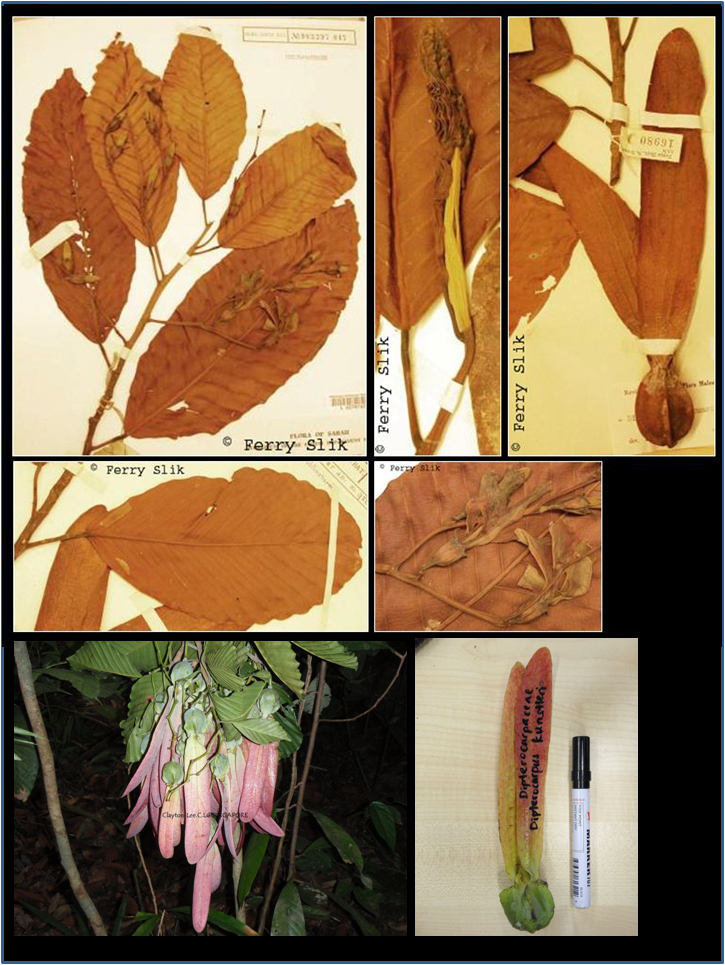Dipterocarpus kunstleri King, J. R. As. Soc. Beng. Sc. 62, 2 (1893)
Named after H.H. Kunstler, a German plant collector who worked in the Botanical Gardens of Calcutta.Synonyms
Dipterocarpus exalatus Sloot. ex Wood
Dipterocarpus speciosus Brandis
Diagnostics
Upper canopy tree up to 50 m tall and 136 cm dbh. Stem with resin. Stipules
up to ca. 70 mm long. Leaves alternate, simple, penni-veined, glabrous, lamina
folded between secondary veins. Flowers ca. 80 mm in diameter,
white-yellow-pink, placed in racemes. Fruits ca. 30 mm long, red-green, with two
ca. 110 mm long placed on top of the nut, wind dispersed.
Description
Twig, lamina and petiole glabrous; leaf nervation puberulent or glabrous beneath: leaf bud and stipule
outside persistently densely minutely pale grey adpressed puberulent, appearing grey lepidote. Twig
to 5 mm apically, terete or slightly ribbed and compressed; stipule scars prominent. Bud 12-15 by
2-3.5 mm, narrowly falcate, acute. Stipule to 7 by 0.8 cm, linear. Leaves 13-22 by 7-10 cm, elliptic to
broadly lanceolate, base cuneate; apex shortly acummate (more prominently acuminate in young trees):
nerves 16-18 pairs, prominent beneath, at c. 40 to 50 degrees: petiole 2-3 cm long. Raceme to 22 cm long,
terminal or axillary, slender, glabrous, somewhat compressed, singly branched. Flower bud 3.5 by 1.5
cm. Calyx and corolla typical, calyx glabrous. Stamens c. 30, somewhat longer than the style;
filaments short, anthers linear, tapering: appendage to connective as long as anther, slender. Ovary
ovoidconical, shortly densely pubescent: stylopodium and style about 5 times as long as the ovary,
tapering from the base, shortly tomentose but for apical quarter. Fruit calyx glabrous; tube to 5 by
2.5 cm. ellipsoid, tapering gradually to the base and to the strongly constricted c. 1 cm diameter
neck: 5-ribbed or almost winged, the ribs c. 1 mm thick and 4 mm broad apically, either confined to
the apical half or continuing to the base as shallow rounded ridges, terminating +/- abruptly distally
as obtuse tubercles; 2 longer lobes to 11 by 1.5 cm, of very variable length, sometimes no longer than
shorter lobes, lanceolate, coriaceous, obtuse, tapering abruptly to the c. 5 mm broad base, 3-nerved,
nerves indistinct: shorter lobes to 6 by 5 mm, small, recurved, somewhat thickened. [from Flora
Malesiana]
Ecology
In undisturbed mixed dipterocarp forests up to 100 m altitude. Often on
alluvial sites, but also found on hillsides and ridges with sandy to clayey
soils.
Uses
The timber is commercially harvested.
Distribution
Peninsular Malaysia, Sumatra, Borneo, Philippines.
Local names
Borneo: Beo, Binawan, Isak, Kambalong, Karang, Karup, Keruing, Keruing kelimbing,
Keruing kuntum puteh, Keruing rapak, Keruing salatus, Keruing simpor, Tabuloh,
Tempudau.
Malaysia: Keruing gombang, Keruing gombang merah.
Sumatra: Keruing batu, Keruing jombor, Keruing minyak, Lagan laweh, Lagan daun lebar.
